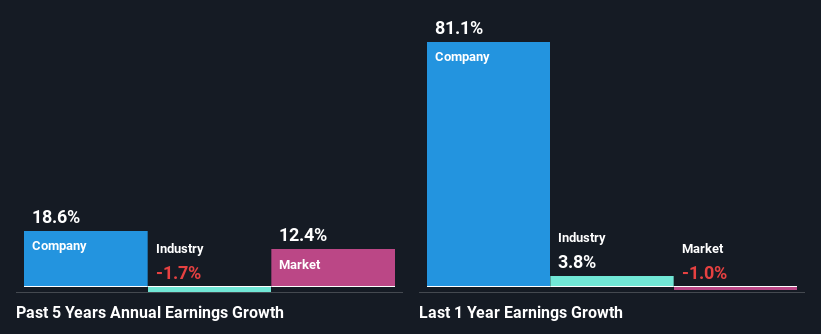Stock Analysis
- United Kingdom
- /
- Pharma
- /
- LSE:AZN
AstraZeneca PLC's (LON:AZN) Stock Has Seen Strong Momentum: Does That Call For Deeper Study Of Its Financial Prospects?

AstraZeneca (LON:AZN) has had a great run on the share market with its stock up by a significant 7.5% over the last month. We wonder if and what role the company's financials play in that price change as a company's long-term fundamentals usually dictate market outcomes. Particularly, we will be paying attention to AstraZeneca's ROE today.
Return on Equity or ROE is a test of how effectively a company is growing its value and managing investors’ money. Simply put, it is used to assess the profitability of a company in relation to its equity capital.
See our latest analysis for AstraZeneca
How Do You Calculate Return On Equity?
ROE can be calculated by using the formula:
Return on Equity = Net Profit (from continuing operations) ÷ Shareholders' Equity
So, based on the above formula, the ROE for AstraZeneca is:
15% = US$6.0b ÷ US$39b (Based on the trailing twelve months to December 2023).
The 'return' is the yearly profit. One way to conceptualize this is that for each £1 of shareholders' capital it has, the company made £0.15 in profit.
What Is The Relationship Between ROE And Earnings Growth?
So far, we've learned that ROE is a measure of a company's profitability. Based on how much of its profits the company chooses to reinvest or "retain", we are then able to evaluate a company's future ability to generate profits. Generally speaking, other things being equal, firms with a high return on equity and profit retention, have a higher growth rate than firms that don’t share these attributes.
AstraZeneca's Earnings Growth And 15% ROE
At first glance, AstraZeneca seems to have a decent ROE. Even when compared to the industry average of 14% the company's ROE looks quite decent. This probably goes some way in explaining AstraZeneca's moderate 19% growth over the past five years amongst other factors.
When you consider the fact that the industry earnings have shrunk at a rate of 1.7% in the same 5-year period, the company's net income growth is pretty remarkable.

Earnings growth is an important metric to consider when valuing a stock. The investor should try to establish if the expected growth or decline in earnings, whichever the case may be, is priced in. By doing so, they will have an idea if the stock is headed into clear blue waters or if swampy waters await. Is AZN fairly valued? This infographic on the company's intrinsic value has everything you need to know.
Is AstraZeneca Making Efficient Use Of Its Profits?
While AstraZeneca has a three-year median payout ratio of 95% (which means it retains 4.6% of profits), the company has still seen a fair bit of earnings growth in the past, meaning that its high payout ratio hasn't hampered its ability to grow.
Moreover, AstraZeneca is determined to keep sharing its profits with shareholders which we infer from its long history of paying a dividend for at least ten years. Upon studying the latest analysts' consensus data, we found that the company's future payout ratio is expected to drop to 33% over the next three years. The fact that the company's ROE is expected to rise to 30% over the same period is explained by the drop in the payout ratio.
Conclusion
On the whole, we do feel that AstraZeneca has some positive attributes. Especially the growth in earnings which was backed by an impressive ROE. Still, the high ROE could have been even more beneficial to investors had the company been reinvesting more of its profits. As highlighted earlier, the current reinvestment rate appears to be negligible. The latest industry analyst forecasts show that the company is expected to maintain its current growth rate. To know more about the company's future earnings growth forecasts take a look at this free report on analyst forecasts for the company to find out more.
Valuation is complex, but we're helping make it simple.
Find out whether AstraZeneca is potentially over or undervalued by checking out our comprehensive analysis, which includes fair value estimates, risks and warnings, dividends, insider transactions and financial health.
View the Free AnalysisHave feedback on this article? Concerned about the content? Get in touch with us directly. Alternatively, email editorial-team (at) simplywallst.com.
This article by Simply Wall St is general in nature. We provide commentary based on historical data and analyst forecasts only using an unbiased methodology and our articles are not intended to be financial advice. It does not constitute a recommendation to buy or sell any stock, and does not take account of your objectives, or your financial situation. We aim to bring you long-term focused analysis driven by fundamental data. Note that our analysis may not factor in the latest price-sensitive company announcements or qualitative material. Simply Wall St has no position in any stocks mentioned.

Simply Wall St
About LSE:AZN
AstraZeneca
AstraZeneca PLC, a biopharmaceutical company, focuses on the discovery, development, manufacture, and commercialization of prescription medicines.
Good value with reasonable growth potential and pays a dividend.
